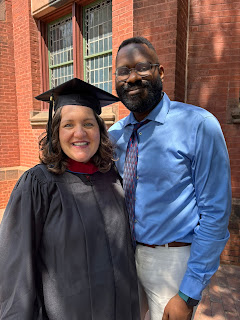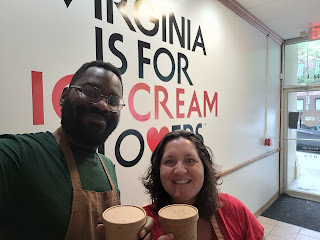Catching up with Caitlin --- Journeying Through Discernment
Saturday, May 31, 2025
May 2025
Monday, April 28, 2025
April 2025
I'm in the midst of quite a few "endings" and holding space for those feels important to me. This week I'll work my final shift as a PRN Chaplain at the hospital. I'll also work my final internship day at Covenant Woods. Yesterday, I led my final worship and preached my final sermon at Covenant Woods. In a few weeks I'll preach at my internship church, Ginter Park Presbyterian, and say "see you later" to those good folks. In less than a month I'll graduate from UPSem and then in less than two months we'll move away from Richmond. There's a lot of change on the horizon and friends, change is hard! Transition includes many moving parts. Saying "see you later" to incredible learning sites and supportive places includes grief. So I'm sitting in that space for a little bit. I'm enjoying and grieving the "lasts" while simultaneously looking forward to all of the new beginnings that follow.
I can't share details yet, but I'm currently in the late stages of the discernment process with a call. So "if the way be clear," as Presbyterians like to say, things will become official with this call in the next month or two. And "if the way be clear," I'll start the call in September (I'm thankful for some built-in maternity leave!) and Charles will continue to work remotely. While we're experiencing a lot of endings right now, there is literal new life that'll begin soon. Growing a baby inside of me is an absolute privilege. I feel tired frequently, I always feel hot, and simple tasks like tying my shoes are proving more difficult each day. But what a gift and honor it is to carry this baby girl. When I started to read Scripture yesterday before the sermon began, baby girl began moving all around. It's like she knew it was time for the sermon so she was getting ready for it (although I'm betting she was more excited than most people feel before a sermon begins 🤣).
Our Richmond endings invite time for reflection, gratitude, and lots of "soaking it up" moments. Our Richmond endings also give space for our new beginnings. Our apartment looks a bit like a storage unit with baby items sprinkled throughout. But we're excited to create a new home once we move knowing that "home" includes many places for us. When asked what Charles is most excited about in terms of becoming a dad, he says it's bonding with our baby girl, taking care of her, and watching her grow. For me, I can't wait to create new traditions as a family of three; to continue traditions we've created for the two of us, which are informed by traditions in our families, but also to create some new ones for our growing family. Ultimately, we feel extremely blessed. We're grateful for the multitude of ways that God continues to work through our lives. And of course we appreciate the continued love, support, prayers, and encouragement from all of y'all.
Sunday, March 30, 2025
March 2025
In 10 days I'll submit the final two assignments of my seminary career. In a month I'll complete my internship at Covenant Woods, a Continuing Care Retirement Community, which has been an incredible place to learn and grow. In less than two months I'll graduate from UPSem with a Master of Divinity. Recently I've spent a lot of time reflecting on the last 3 years. Time has seriously flown by and actually, I'm at a loss for words right now (shocking, I know!) to describe my time in seminary and the discernment process. For now, I'll just share gratitude for all the folks who've supported, encouraged, and prayed for me during this time. Here are some March updates:
At the UPSem Richmond Student Awards ceremony, I received the E.T. George Excellence in Homiletics, Worship, & Public Speaking award. This is a great honor and gift! When I shared this news with my grandmothers, I was reminded that I never posted about another award I received back in December. Last Fall I applied for a scholarship from Grace Presbytery via First Presbyterian Church Fort Worth, TX. In December, I received a notification that I'd received the scholarship, the Karl Travis Excellence in Preaching award. Again, what a gift and this one is especially neat since my dad attended college with Rev. Travis. Perhaps these awards are a sign of my future call to ministry... :)
At the beginning of March, Charles and I spent a weekend in Texas with family and friends and got to witness our niece's baptism. No trip home is complete without spending time with my St. Andrew liaison, Julie. We enjoyed catching up although I missed being at worship or at Super Wednesday with the rest of our St. Andrew family! In mid-March, Charles and I enjoyed a birthday dinner with my mother-in-law in Prince George's County, MD for her birthday. We also attended a faith & justice event through RISC called the Nehemiah Action. I had the privilege of visiting a Muslim mosque for an interfaith panel, the observation of the Maghrib prayer (4th of the 5 Islamic prayers each day), and participated in Iftar, which is the breaking of the fast during the Holy Month of Ramadan. And I preached on the 3rd Sunday of Lent at my internship, Covenant Woods. I closed out the month of March by working a 12 hour hospital shift at VCU Hospital. Chaplaincy is hard, y'all, especially in a trauma setting. I'm grateful for the Spiritual Care team there who does such important work and that I've had the privilege of working there as an intern and a PRN Chaplain.
Friday, February 28, 2025
February 2025
Hi Friends, I don't know about y'all, but February flew by for me. I sat at my computer yesterday and after I read this week's Shield, I realized "Oh no! I only have one day of February left to blog!" So here we are. It's always good to be e-connected with y'all. And I'm excited to be in Denton next week! I'll miss being with y'all at church on Sunday. I'll be worshiping with my family at FPC Dallas because my dad will baptize our niece at her home church that day. But maybe I'll run into you around town while we're visiting 😀
Friday, January 24, 2025
January 2025
Friday, December 27, 2024
December 2024
We journeyed through the waiting period of Advent and now we celebrate and honor the season of Christmas. Last year I preached on Epiphany weekend and I started my sermon by gauging when folks take down their Christmas decorations --- in my family, we keep using Christmas dishes and keep all of the Christmas decorations out until we celebrate Epiphany. I'm not sure how common this is. Perhaps we follow the church calendar for our family's tradition because my dad is a minister?! Whatever the reason, it's a tradition that my husband and I carry on. So we're still enjoying our Christmas lights, nativity scene, my favorite 80 year old singing Christmas tree (it was my Grandmother's when she was a child), and our friends' and families' holiday greeting cards which hang in the kitchen.
This time of year is one that is typically slow for students. There's a break from classes and deadlines. But this year, I'm not taking much of a break. I worked as a PRN Chaplain at VCU Hospital on Christmas Eve and am doing that a couple more times during break. I worked at my internship 3/5 days of the first week of my holiday break. And our Christmas plans included the day-trip to DC to see family, which is always well worth it, but also an exhausting day because of traffic. I'm also in job-applying mode, which takes a lot of time and energy. But it's an exciting time to discern and learn where God might be calling me!
We hosted family for the first time for Christmas, which was a lot of fun. Charles' Mom came to town on Christmas Eve, we ate dinner, then went to Ginter Park Presbyterian Church's 9pm worship service. We stayed in our pajamas all of Christmas day as we talked with each of our families in England, Grenada, Nigeria, Oregon, Texas, Florida, and DC and enjoyed my mother-in-law's cooking. On the 26th we drove into the DC area and spent the day with Charles' Dad and his siblings. We're grateful for the love of family and friends always, and especially during the holiday season. I know that the holiday season is a particularly difficult time for some folks, especially those who are hospitalized, so we hold them close to our hearts.
Here are a few photos from December:
Saturday, November 30, 2024
November 2024
May 2025
What a last 10 days we've had in Richmond! I graduated from seminary, family came into town, we celebrated for multiple days, we finaliz...

-
What a last 10 days we've had in Richmond! I graduated from seminary, family came into town, we celebrated for multiple days, we finaliz...
-
In 10 days I'll submit the final two assignments of my seminary career. In a month I'll complete my internship at Covenant Woods, a ...
-
I'm in the midst of quite a few "endings" and holding space for those feels important to me. This week I'll work my f...






















































